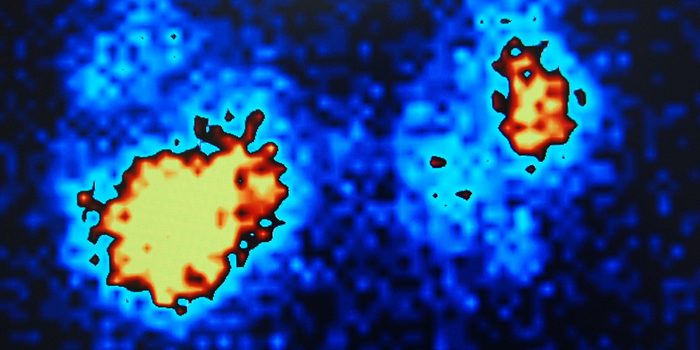
Thyroid Nodules
Thyroid nodules are cysts or masses that develop within the thyroid, which is small gland at the lower portion of the front of your neck. Thyroid nodules are extremely common, and the likelihood of developing them increases as you get older. The vast majority of thyroid nodules are benign and do not require treatment; however, roughly five percent of thyroid nodules are found to be malignant.
Symptoms
The majority of individuals with thyroid nodules do not experience any symptoms. In fact, a nodule can sometimes go undetected until a patient receives an imaging study of the neck for some unrelated reason. With larger nodules, however, there may be a noticeable lump at the front of the throat. Large nodules may cause symptoms, including:
- Neck or jaw pain
- Difficulty swallowing
- Difficulty breathing if the mass is large enough to compress the airway
Causes and Risk Factors
The exact cause of benign thyroid nodules is not clear. It is believed that alcohol consumption and smoking may contribute to goiters and thyroid enlargement. Women with uterine fibroids are also more likely to develop thyroid nodules. There may also be a genetic link to an increased risk for certain types of goiters.
Though it is rare for a thyroid nodule to be cancerous, certain factors can increase the likelihood that a particular nodule may be malignant:
- Nodules in children are twice as likely to be cancerous than those in adults. The risk is also higher for those under 30 and over 60.
- Thyroid nodules in men have twice the malignancy rate of those in women.
- A history of radiation therapy to the head or neck increases your risk for nodules and thyroid cancer.
- Individuals with a family history of multiple endocrine neoplasia or Garner’s syndrome have a higher incidence of malignant thyroid nodules.
Diagnosis and Treatment
The majority of thyroid nodules are either discovered by the patient when they see or feel a lump on their throat or upon physical exam by a doctor. Various blood tests may be ordered to determine if your thyroid is functioning normally. You doctor may also use ultrasound imaging to determine the size and other characteristics of the nodules.
Fine needle aspiration is the standard method used to evaluate thyroid nodules. This involves placing a small needle into the nodule, oftentimes using an ultrasound to guide placement, and obtaining a small sample of the nodule contents for further examination. Fine needle aspiration is 95 percent accurate in determining if a nodule is benign and 99 percent accurate when cancer is identified. In rare cases, a radioiodine thyroid scan may be performed. This test is typically only performed if your blood tests indicate a low TSH level, which may suggest hyperthyroidism, also referred to as Graves’ disease.
Available Treatments
If diagnostic tests clearly indicate that your thyroid nodule is benign, the doctor will most likely recommend a “wait and see” approach and order periodic follow-up ultrasound examinations to ensure that the nodule remains stable in size and appearance. Surgery may be recommended if the nodule becomes symptomatic.
If the above tests indicate that the nodule may be malignant, your doctor may perform a thyroid lobectomy to obtain a sample for further examination. A confirmed thyroid cancer typically requires a complete thyroidectomy and possibly removal of the surrounding lymph nodes. Your doctor will help you determine the most appropriate option based on variables such as the size and type of tumor and your health history and risk factors.

